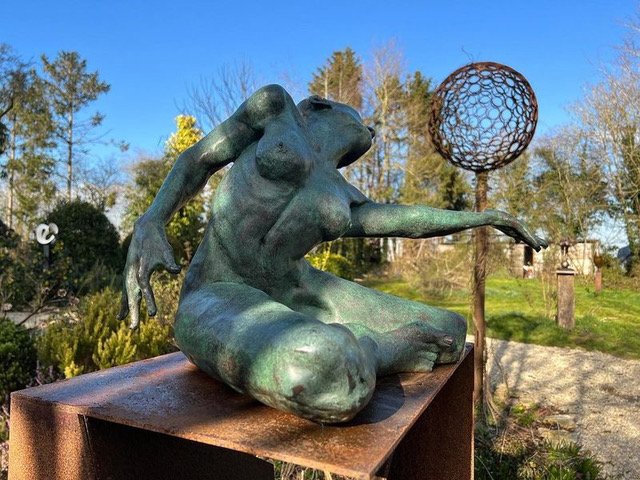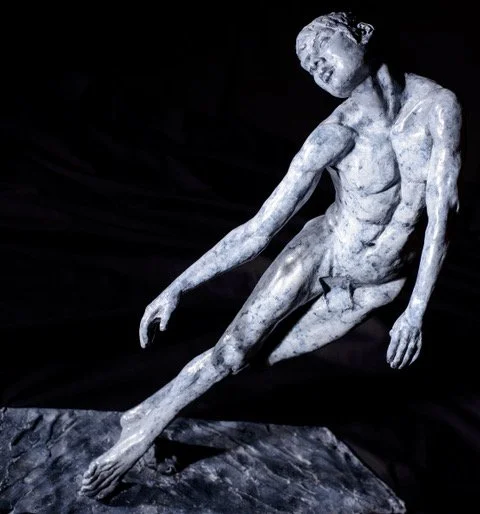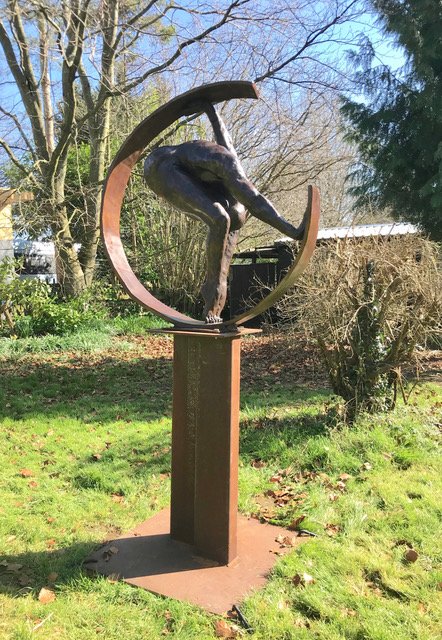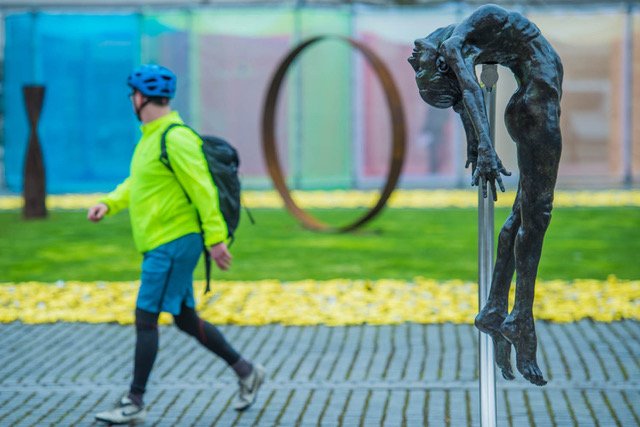ARTIST INTERVIEW: Teresa Wells
Please introduce yourself. What sparked your interest in becoming an artist?
My name is Teresa Wells MRSS, I am a bronze figurative sculptor and member of The Royal Society of Sculptors.
I have always created, but the leap from creating as a pastime to creating now as a professional, took around 30 years.
Why are you so fascinated by the human figure? How does your work centre around human behaviour?
Becoming interested in social anthropology whilst studying Fine Art at university, my abstract sculptures needed to become more accessible for my audience to connect. Studying anatomy presented a real challenge for me. Communicating literally the complexities of human thought and deed using body language and facial expression, was an opportunity to connect directly with a greater audience.
How does your medium help convey the narrative? What can you achieve through sculpture that you can’t through 2-dimensional works?
Sculpture is extremely visceral, with its occupancy of space and place, creating additional layers of meaning. The sculptor considers the object they are making, but also considers how it will be approached within an environment. Will it sit high or low, twisted or linear, interactive, or present a barrier? For me, this provides more interesting scenarios to the viewer as I sculpt in the round, additional messages are received depending on which plane you are observing. With the additional sensory capacity of touch, bronze is evocative of history, legacy and timelessness.
Where do you find your inspiration? What makes an interesting figure to sculpt?
I often sculpt the bodies of dancers and athletes, as my work focuses on conveying survival. I am fascinated by stories of strength in the face of adversity, therefore I use strong bodily shapes to convey the outer coping self, which often masks the inner fragile self. That is why most of my sculpts are presented in vulnerable positions or poses.
Thinking about your most recent piece, what was your creative process from start to finish? Do you have a favourite stage in your process?
‘To The Left, To The Right’ is my most recent piece. I spend lots of time gathering information; generally about current human trends or stories. These are often 'scrap booked’. I then make a series of very sketchy line drawings, developing an idea. My favourite process is the design and creation of the armature and the application of supporting back irons etc. Clay is applied and can take some time as I assess the meaning of the pose and the sculpture’s final form and impact. It is molded, and I create a wax at the foundry, before it is then run up with a feed system, invested and then cast. I often become involved in the making at the foundry, as I love process and materials.
What thoughts and feelings would you like to evoke from the viewer? How does producing artwork make you feel?
A reaction of any sort, is a good reaction for me. I also like to hear the viewer's interpretation; especially if it is different to the story I was trying to tell. In terms of producing the artwork myself, I love the piece when it finally comes together, clay to bronze, but then I am ready to move on with new work.
Tell me about a typical day in your studio. How does the space you have created inspire you?
I spend a lot of time on sales and marketing, especially in the summer months, I would say around 80%. This can involve computer work, attending PV’s and shows, delivering sculpture or picking up and getting involved with press and social media. When I do get a day in the studio, I tend to switch off all telecommunication, as I let the space allow me the luxury of silence so I can create.
Which has been your favourite sculpture to work on and why?
It is always the last sculpture I made, as I am constantly seeking new ways to express.
What has been your greatest achievement so far as an artist? Have you endured any challenges?
My greatest achievement has been to work as a sculptor. To show work in London and the UK, to sell work to collectors all over the world. I am a little bit proud to have created a sculpture for The New Blue Peter Garden at Chelsea Flower Show 2022 (I was inspired by that show as a child). I have also had work feature on Netflix’s Dracula series, I was interviewed by the BBC, and featured in both the Independent and Times Newspaper, and have work in a permanent public collection in the USA.
Why do you think art is important in society?
Creativity is vital to human society. Though art is able to transcend, the need for creative outcome is about functionality. Art enables humans to speak without words and communicate across cultural boundaries. Artists can convey emotion, feeling, physical and mental state and document moments in history that convey stories about our experience of what it is like to be a human, without words. It is a powerful communication tool, especially in enabling those who struggle to express in words; complicated anxieties and feelings.











